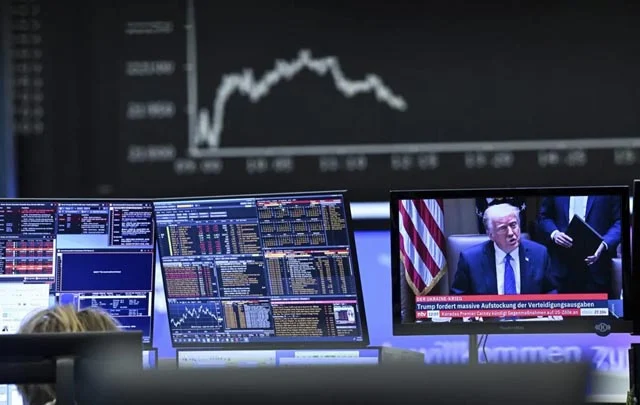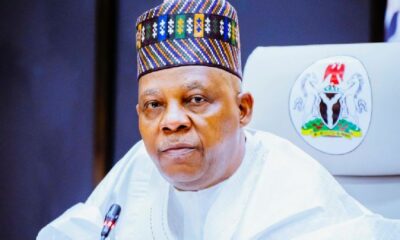Economy
Naira crashes against dollar on FX markets

The naira crashed against the dollar at both official and parallel foreign exchange markets to begin the week on a negative note.
FMDQ data showed that the naira weakened to N1,675.62 per dollar on Monday from N1652.62 last Friday, indicating a N23 loss.
Similarly, at the black market, the naira depreciated to N1,755 per dollar on Monday from the N1,750 exchange rate at last week’s end.
This comes as the FX transaction turnover dropped significantly to $108.79 million on Monday from $243.05 million recorded on Friday, according to FMDQ data.
In the past months, the country’s FX market has continued to witness fluctuations despite interventions by the Central Bank of Nigeria.
Economy
CHECK Exchange Rate As Naira Weakens More In Parallel Market

Naira has continued its downward slide in the parallel market on Thursday, exchanging at N1,621/$1, a depreciation from N1,580/$1 recorded just a day earlier on Wednesday.
This represents a N41 decline in 24 hours, deepening concerns among traders and economic watchers about sustained volatility in the FX market.
While the official exchange rate stood at N1,644.00/$1 on Wednesday, according to figures published on the Central Bank of Nigeria (CBN) website, there was no updated official rate published by the CBN several hours after the market close on Thursday.
Meanwhile, market participants at Wuse Zone 4 in Abuja attributed the persistent depreciation to a resurgence in speculative activities, unmet demand from importers, and lingering confidence issues in the foreign exchange market.
Alhaji Aminu Gwadabe, President of the Association of Bureau De Change Operators of Nigeria (ABCON), attributed the ongoing volatility in the forex market to a mix of local and global uncertainties. In a message sent to Nairametrics, he stated:
“The volatility, fears, happenings, and shocks in both the local and international markets called for disdain.
President Trump’s tariff announcements have sent markets into panic, loss of confidence, revenue losses, and budget reviews.”
He added that despite ongoing interventions by the CBN, instability persists.
“As usual, the CBN, being a catalytic actor, must continue to ensure stability through timely interventions. However, volatility remains a challenge and needs to be more comprehensively addressed,” Gwadabe said.
He further called for an expanded policy transmission mechanism to better serve the retail end of the FX market.
“It is therefore necessary for the CBN to reevaluate the efficacy of that Policy transmission mechanisms and expand its scope to the BDCs retail segment of the market to cater for the needs of the critical retail needs of invisible transactions where the BDCs pose the most potent tool of the CBN policy transmission mechanism.”
Dr. Muda Yusuf, CEO of the Centre for the Promotion of Private Enterprise (CPPE), also linked the naira’s recent struggles to global developments and speculative pressures.
“This is not unconnected to recent policy signals from President Trump and global oil price movements. The market is heavily information-driven, and speculative pressure has spiked following the tariff announcements,” Yusuf explained.
“Now that Trump appears to be having second thoughts, we might even see a bit of a breather in the FX market,” he added.
Meanwhile, traders on the ground say the situation is being worsened by the uncertainty surrounding ongoing government reforms and inconsistent access to official FX windows.
“The demand today was unusually high, especially from small businesses that can’t access the banks. It’s putting pressure on our supply,” a trader at Abuja’s Wuse Zone 4, who asked not to be named stated.
The spread between the official exchange rate of N1,644/$1 and the parallel market rate of N1,621/$1 narrowed slightly on Thursday, a sign that some convergence may be taking place, despite persistent volatility.
Market analysts warn that unless the CBN resumes consistent interventions or significantly boosts FX liquidity, the naira may continue to face downward pressure in the weeks ahead
The continued slide of the naira, despite heightened CBN interventions, signals persistent challenges in Nigeria’s FX liquidity and structural demand-supply mismatch.
Economy
Asian stocks jump as Trump postpones painful tariffs

Stocks rocketed Thursday as a relief rally spread through markets after Donald Trump paused crippling tariffs on US partners, with Chinese markets even brushing off his decision to ramp up duties on Beijing to 125 percent.
The across-the-board gains tracked a blistering performance on Wall Street as the US president said he would delay for 90 days measures announced last week that set off a firestorm on trading floors and sparked global recession fears.
Trump said he would keep in place a basic levy of 10 percent on dozens of countries but upped the ante in his brutal trade war with superpower rival China by hitting it even harder after it retaliated.
China’s own 84 percent retaliatory measures kicked in at 0401 GMT Thursday, later saying that US tariffs would “severely impact the stability of the global economic order”.
Trump made the decision because he said investors were “jumping a little bit out of line” as markets collapsed and US Treasuries — considered the safest option in times of crisis — were also showing signs of cracking on concerns about the world’s top economy.
People “were getting yippy, a little bit afraid”, he added, referring to a term in sports to describe a loss of nerves.
The extra tariffs on Beijing, however, were “based on the lack of respect that China has shown to the world’s markets”, Trump said.
The president denied he had made a U-turn, telling reporters that “you have to be flexible”.
And his top trade advisor, Peter Navarro, said, “This will go down in American history as the greatest trade negotiating day we have ever had.
“We’re in a beautiful position for the next 90 days, we’ve got over 75 countries that are going to come in and negotiate with us and what they’re going to have to do, without fail, is they’re going to have to lower their non-tariff barriers.”
Trump’s shock announcement on his Truth Social network sparked a buying frenzy as Asian and European investors chased beaten-down stocks.
“Asia markets are flipping the switch — from fear to euphoria — as Trump throws a 90-day lifeline, pausing the reciprocal tariff barrage,” said Stephen Innes at SPI Asset Management.
“The president’s post nodded to the ‘yippy’ reaction to his historic hikes, and honestly, that sums it up.
“We just witnessed one of the all-time bouncebacks — and now, we look for Asia investors, much like their North American counterparts, to step in and buy the ‘yips’.”
Hong Kong rallied more than two percent — a third day of gains after collapsing more than 13 percent on Monday in its worst day since 1997 during the Asian financial crisis. Shanghai gained more than one percent.
The two markets have been given extra support by optimism that China will unveil fresh stimulus to support its economy in light of the tariff measures. Official data showing another drop in consumer prices last month added to those hopes.
– ‘Fear to euphoria’ –
Tokyo’s Nikkei surged more than nine percent, while Taipei’s 9.3 percent gain was its best rise on record — after Monday’s 9.7 percent drop represented its worst fall.
Seoul, Singapore, Jakarta, Sydney, Saigon and Bangkok climbed between four and 6.6 percent. Manila and Wellington were also well in the positive territory.
London, Paris and Frankfurt soared at the open.
Tech firms were the standout performers, with Sony, Sharp, Panasonic and SoftBank chalking up double-digit gains, while airlines, car makers and casinos also enjoyed strong buying.
Apple suppliers posted strong rallies — Hong Kong-listed AAC Technologies surged 5.6 percent and in Taiwan, Hon Hai added almost 10 percent.
Gold surged almost three percent to around $3,120 — around $50 short of its record touched last month — thanks to the weaker dollar and as the uncertainty saw investors rush into the safe haven.
Chihiro Ota, at SMBC Nikko Securities, said: “What happens now? If the US takes a hardline stance (in negotiations), then the market would be disappointed. If it turns out that they can engage in talks, then it may create a room for (an upswing).”
US Treasury yields also edged down after a successful auction of $38 billion in notes, said Briefing.com.
That eased pressure on the bond market, which had fanned worries that investors were losing confidence in the United States.
However, observers warn that the China-US standoff could be another step towards a disengagement from the world’s top two economies.
“The escalation of the trade war between the US and China suggests that a full trade decoupling is increasingly likely,” said Mali Chivakul, emerging markets economist at J. Safra Sarasin bank.
“Even if we may see a de-escalation later, a decoupling could still be the result.”
Trump’s trade war is also causing a headache for the US Federal Reserve as it weighs whether to cut interest rates to protect the economy, or keep them elevated to ward off the inflation many say tariffs will fuel.
Minutes from its March meeting, released Wednesday, showed members felt they “may face difficult tradeoffs if inflation proved to be more persistent while the outlook for growth and employment weakened”.
Oil prices edged down after bouncing more than four percent Wednesday, though they remain under pressure amid concerns about the global economy and its impact on demand.
– Key figures around 0715 GMT –
Tokyo – Nikkei 225: 9.1 percent at 34,609.00 (close)
Hong Kong – Hang Seng Index: UP 2.7 percent at 20,804.08
Shanghai – Composite: UP 1.2 percent at 3,223.64 (close)
London – FTSE 100: UP 6.1 percent at 8,145.26
Dollar/yen: DOWN at 147.05 yen from 147.82 yen on Wednesday
Euro/dollar: UP at $1.0968 from $1.0948
Pound/dollar: UP at $1.2875 from $1.2810
Euro/pound: DOWN at 85.20 pence from 85.45 pence
West Texas Intermediate: DOWN 0.6 percent at $62.00 per barrel
Brent North Sea Crude: DOWN 0.7 percent at $65.04 per barrel
New York – Dow: UP 7.9 percent at 40,608.45 (close)
AFP
Economy
Mobile Money transactions hit $1.68trn in one year

Mobile money platforms processed about 108 billion transactions valued at $1.68 trillion in 2024, according to GSMA’s ‘State of the Industry Report on Mobile Money 2025’ report released Tuesday.
GSMA’s mobile money programme works to advance the mobile money ecosystem of communities that lack access to more traditional banking services. The global body for telecom operators stated that mobile money transaction volumes increased by 20 percent year-on-year, while transaction values grew by 16 percent, up from a 13 percent increase in 2023.
“Transaction volumes and values for mobile money accounts experienced robust double-digit growth in 2024. Approximately 108 billion transactions, totalling over $1.68 trillion, were processed through mobile money accounts in 2024,” the report said.
Vivek Badrinath, director general of GSMA, said mobile money has emerged as a powerful driver of financial inclusion and economic growth. “Its continued success depends on supportive regulatory environments that promote innovation, accessibility, and help unlock the full socio-economic potential.
“To ensure mobile money remains accessible, affordable, and safe, it is vital for governments and regulators to work with financial service providers to support financial literacy programs, empowering underserved populations and opening new opportunities for financial decision-making,” he said.
The report stated that the GDP of countries with mobile money services increased by approximately $720 billion by 2023, reflecting a 1.7 percent increase. In Sub-Saharan Africa, mobile money added about $190 billion to GDP in the same year.
“The region remains the leader in mobile money, with active accounts increasing notably in East and West Africa. East Africa was highlighted for its growth in active accounts in 2024, followed by Southeast Asia and West Africa. Countries in East Asia-Pacific, including Cambodia, Fiji, the Philippines, and Vietnam, also demonstrated growth, attributed to favorable regulatory conditions.”
GSMA noted that mobile money providers in East Asia-Pacific have evolved to offer comprehensive financial services, with 44 percent providing credit services by June 2024. However, challenges persist, particularly for women, as eight of the 12 surveyed countries reported disparities in mobile money ownership based on gender.
“Nearly 60 percent of mobile money providers are addressing these gaps by implementing digital literacy initiatives,” the report said.
Mobile money reached two significant milestones in 2024, surpassing two billion registered accounts and over half a billion active monthly users across the globe. The industry took 18 years to achieve one billion registered accounts and 250 million active users from 2001, but this has doubled in the last five years.
-

 News15 hours ago
News15 hours agoAmbassadorial list ready for NASS review after DSS clearance – FG
-

 News23 hours ago
News23 hours agoMichelle Obama Speaks On Alleged Failed Marriage with Her Husband Barack Obama
-

 News11 hours ago
News11 hours agoSecurity operatives halt attempt to break into VP Shettima’s residence, nab suspect
-

 News8 hours ago
News8 hours agoIbas pouring petrol on fire in Rivers, Briggs laments
-

 News10 hours ago
News10 hours agoSuit Seeking To Sack Ibas As Administrator Suffers Heavy Setback
-

 News16 hours ago
News16 hours agoPopular actress passes away + Photo
-

 News3 hours ago
News3 hours agoConstituents Drag Akpabio, Senate to Court Over Suspension of Natasha
-

 News15 hours ago
News15 hours agoFG Issues Flood Warning for 30 States and FCT in 2025: Communities Urged to Prepare (Full List)


















